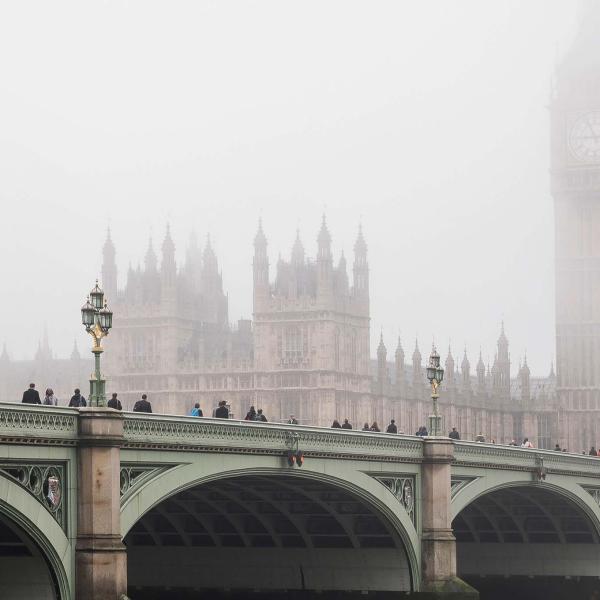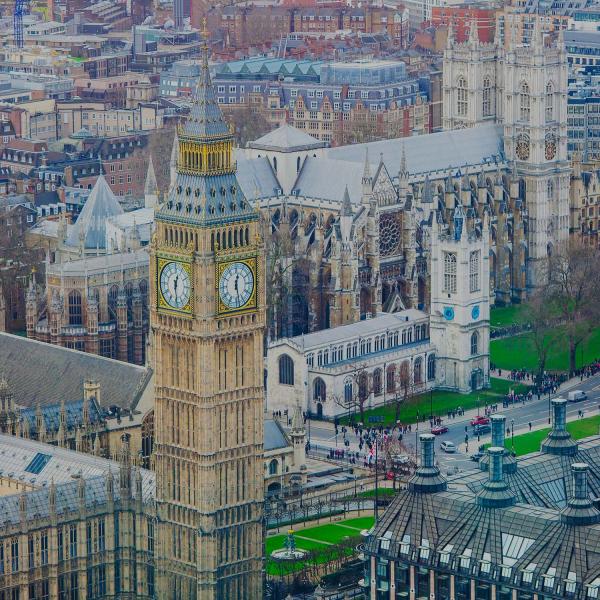The IFS Green Budget 2017, produced in association with ICAEW and funded by the Nuffield Foundation with analysis from Oxford Economics, is published today.
The Chancellor, Philip Hammond, remains committed to his predecessor’s plans for cutting day-to-day public service spending, which is due to fall by 4% in real terms over the next three years, having fallen very little over the last three years. A particularly sharp cut is planned for 2019–20, immediately prior to the next general election. While spending cuts are playing a greater role than tax rises in reducing the deficit, tax is set to rise as a share of national income to its highest level since 1986–87.
The Chancellor has not set himself any fiscal targets that can be missed during the current parliament. But meeting his target of eliminating the deficit during the next parliament will probably mean an additional consolidation of up to £34 billion, extending the period of spending cuts and tax rises well in to the 2020s.
After nearly seven years of tax rises and spending cuts:
- The deficit this year will be higher than in all but 13 of the 60 years before 2008, and remains the fourth highest of 28 advanced economies;
- The national debt is at its highest level as a fraction of national income since 1965–66 and is higher than that faced by all but five other advanced economies;
- Real spending on public services has fallen by 10% since 2009–10 – by far the longest and biggest fall in public service spending on record.
Looking forward, cuts are due to continue and the shape of the state is set to continue changing while taxes carry on rising:
- By 2019–20, real departmental spending is due to be 13% lower than it was in 2010–11, with cuts of around 40% to the justice, business, culture and environment budgets;
- By 2020–21, public spending on each of health, pensions and overseas aid will be higher as a share of national income than pre-crisis, while spending on schools, defence and, especially, public order and safety, will be lower;
- By 2020–21, plans imply 21p of capital spending by central government for every £1 of day-to-day spending on public services: an historically high level and well above the recent low point of 13p reached in 2012–13;
- £17 billion of tax rises are planned over this parliament relative to 2015–16. Tax (and non-tax) receipts are expected to rise above 37% of national income for the first time since 1986–87.
Mr Hammond wants to ensure the structural deficit – that is the deficit after adjusting for the estimated impact of any temporary weakness or strength in the economy – is no more than 2% of national income in 2020–21. That is a much easier target to hit than the previous aim of eliminating the deficit entirely by 2019–20. Even so, previous experience suggests there is a more than one-in-three chance that he will miss even this looser target.
- Economic forecasts are subject to even more uncertainty than usual. Shaving just 1% off growth over the period to 2020–21 could see the deficit rise by £7 billion.
- The official numbers include neither the promised increases to the income tax personal allowance and higher rate threshold, nor the apparently-inevitable failure to uprate fuel duties with inflation. Between them they will cost more than £4 billion by 2020–21.
Nearly three pounds in every ten spent by government goes on health, social care, and benefits to individuals with poor health or disabilities. A particular risk to the public finances may arise from pressure on health and social care spending.
- The five years from 2009–10 to 2014–15 saw the slowest growth rate in health spending since the mid-1950s when comparable data first became available, even though it continued growing as a share of public service spending due to the large cuts faced by other services. Department of Health spending is planned to grow at a similar rate over the five years from 2014–15.
- Plans imply that growth in Department of Health spending in the decade between 2009–10 and 2019–20 will be slightly less than required just to keep pace with population growth and ageing – and that ignores significant other likely cost and demand pressures
- Adult social care spending has fallen by more than 6% since 2009–10 while the population aged 65 and over has risen by nearly 16%. Spending per person seems likely to continue falling.
Efforts to reduce spending on disability and incapacity benefits have delivered much lower savings than hoped. Government has now set itself an ambitious target to halve the gap in employment rates between the disabled and non-disabled populations.
- Spending on incapacity benefits in 2015–16 was £15 billion, 45% higher than was forecast just three years before. Even so spending on incapacity benefits is a smaller share of national income than in any year since 1989–90, largely because average awards have fallen from a quarter to a fifth of average male full-time earnings.
- In 2016–17 government will spend £24 billion – a quarter of non-pensioner benefit spending – on disability and incapacity benefits for working-age people.
- Incapacity benefits have become increasingly focussed on those with low levels of education rather than older people. Low-educated men aged 25–34 are now twice as likely to receive incapacity benefits as high-educated men aged 55–64.
- Success in halving the ‘disability employment gap’ would be a truly remarkable achievement. It would require reducing non-employment among working-age disabled people by a third.
Oxford Economics, with whom we are again collaborating, forecast that UK GDP growth will be a relatively disappointing 1.6% in 2017 and just 1.3% in 2018. The weaker outlook is largely driven by higher inflation, the bulk of which results from the recent sterling depreciation. Though prospects for wages are a little brighter, real earnings could rise by just 0.2% in 2017 compared with 1.7% in 2016. The four-year benefit squeeze also becomes more painful as inflation rises. On the plus side exports are likely to do better as a result of the weaker pound, but overall the negative effects from higher inflation on consumer spending are likely to outweigh these positive effects.
There is an unprecedented degree of uncertainty over longer term economic prospects. This is driven in particular by uncertainty over how Brexit negotiations will play out –what sort of trade agreement, if any, we reach with the EU; what sort of transitional agreement we come to - but also how the Government will use its newly repatriated powers. On the assumption that there will be a three-year transitional arrangement similar to the status quo, followed by a free-trade agreement, and that the Government will take a ‘populist’ approach in areas such as immigration policy Oxford Economics estimates that the UK economy could end up around 3% smaller in 2030 than it would have been if we had voted to remain in the EU.
Fiscal deficits over the next five years are expected to be £293 billion less than over the last five years yet ICAEW show how the government will need to raise £646 billion from external investors, £11 billion more than it raised over the last five years. This reflects the need to refinance debt as it matures, the financing of more student loans and the expected lack of additional quantitative easing going forwards. Thankfully, the Debt Management Office has successfully managed to issue debt that, on average, is more long-term than its counterparts in other advanced economies.
Paul Johnson, Director of the Institute for Fiscal Studies and an editor of the Green Budget, said:
“For all the focus on Brexit the public finances in the next few years look set to be defined by the spending cuts announced by George Osborne. Cuts to day-to-day public service spending are due to accelerate while the tax burden continues to rise. Even so the new chancellor may not find it all that easy to meet his target of eliminating the budget deficit in the next parliament. Even on central forecasts that is going to require extending austerity towards the mid-2020s. If the economy does less well than hoped then we may see yet another set of fiscal rules consigned to the dustbin.”
Andrew Goodwin, Lead UK Economist at Oxford Economics and co-author of a chapter in the Green Budget, said:
“Though the UK economy has continued to achieve solid growth, it has been almost entirely reliant on the consumer. With spending power set to come under significant pressure from higher inflation and the welfare squeeze, the consumer will not be able to keep contributing more than its fair share. Exports should be a bright spot, but overall a slowdown in GDP growth appears likely.”
If the Government is able to agree a transitional arrangement with the EU and make progress on a free-trade agreement then the impact of Brexit is likely to be fairly modest within our forecast horizon of 2021. However, the negative effects of leaving the single market and the customs union are likely to become clearer over time and we estimate that the new trading arrangements could reduce UK GDP by around 3% by 2030, compared with remaining in the EU. Should we fail to secure a free-trade agreement then the outcome is likely to be worse still.”
Ross Campbell, ICAEW Director of Public Sector and co-author of two chapters in the Green Budget, said:
“The total liabilities of £3.6 trillion reported at 31 March 2015 have now reached 191% of GDP and are almost two and half times the narrower measure of public sector net debt reported in the National Accounts of £1.5 trillion. Put into perspective, WGA debt is now equivalent to £130,000 per household - as opposed to £70,000 using statistical accounting. In order to restore trust in Government, and to give taxpayers a clear picture of how much liability the Government has assumed on their behalf, it’s important that more emphasis be placed on the WGA.”
Three chapters of the Green Budget were pre-released
Differences in the way the tax system treats the self-employed, owner-managers and employees are costly, inefficient and unfair
Over the last 8 years 39% of the growth in the workforce has come from the self-employed and owner managers. They pay a lot less tax than employees earning the same amount, leading the OBR to worry that tax revenues will be £3.5 billion less in 2021–22, relative to a world in which the small company population and employment grew at the same rate. The different tax treatments also create incentives for people to change legal form to avoid tax and create inequities between people earning the same amount for doing similar work. It is both desirable and practicable to reduce these differences.
The new apprenticeship levy will raise nearly £3 billion a year, but government spending on apprenticeships in England is only expected to increase by £640 million between 2016–17 and 2019–20
A combination of targets to ensure 600,000 apprenticeship starts each year, and a zero or near zero cost to employers, risks poor value for public money. Additional targets for every public sector employer with more than 250 staff are also likely to lead to costly and inefficient behaviour.
On a Whole of Government Accounts measure, the accounting deficit fell only half as much as the traditional National Accounts measure in the five years to 2014–15
In a detailed analysis of WGA, ICAEW set out the importance of taking a wider view of government finances than the traditional National Accounts. Recent reductions in the deficit were offset by increases in liabilities associated with public service pensions. The WGA also illustrate the importance of taking account of other liabilities such as those for clinical negligence and nuclear decommissioning.
Ends
Notes to editors
1. The full Green Budget 2017 publication, with analysis from IFS and additional analysis from ICAEW and Oxford Economics, will be launched at 10:00am on Tuesday 7 February 2017 at the Guildhall, City of London (https://www.ifs.org.uk/events/1385). Please feel free to attend
2. Presentations will be live-streamed for those unable to attend. You can view the live stream from 10am at https://live.ifs.org.uk/.
3. The full report will go live on the IFS website shortly after 10am: ifs.org.uk. For embargoed copies or other queries, please contact Bonnie Brimstone on 07730 667013, @email or Emma Hyman 020 7291 4850, @email .
4. ICAEW is a world-leading professional membership organisation that promotes, develops and supports over 147,000 chartered accountants worldwide. They provide qualifications and professional development, share their knowledge, insight and technical expertise, and protect the quality and integrity of the accountancy and finance profession.
As leaders in accountancy, finance and business ICAEW members have the knowledge, skills and commitment to maintain the highest professional standards and integrity. Together they contribute to the success of individuals, organisations, communities and economies around the world. Because of this, people can do business with confidence. ICAEW is a founder member of Chartered Accountants Worldwide and the Global Accounting Alliance.
For queries on ICAEW chapters, please contact: Caroline Florence 020 7920 8564 / 07973 400 264
5. The Nuffield Foundation is an endowed charitable trust that aims to improve social well-being in the widest sense. It funds research and innovation in education and social policy and also works to build capacity in education, science and social science research. The Nuffield Foundation has funded this project, but the views expressed are those of the authors and not necessarily those of the Foundation. More information is available at nuffieldfoundation.org
6. Oxford Economics was founded in 1981 as a commercial venture with Oxford University’s business college to provide economic forecasting and modelling to companies and financial institutions. Since then, we have become one of the world’s foremost independent global advisory firms, providing reports, forecasts and analytical tools on 200 countries, 100 industrial sectors and over 3,000 cities. Our best-of-class global economic and industry models and analytical tools give us an unparalleled ability to forecast external market trends and assess their economic, social and business impact.
For queries on Oxford Economic chapters, please contact Andrew Goodwin 020 78031417 / 07795 382 910










